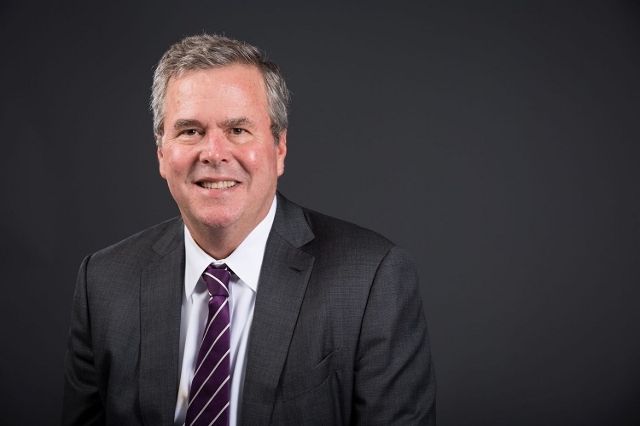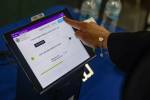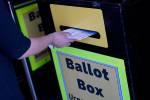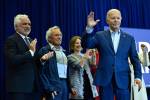Bush aggressively expands presence outside first 4 voting states
MOUNT PLEASANT, South Carolina — The campaign for Jeb Bush, anticipating a competitive primary season, is forming an aggressive presence in states beyond the four that will vote in February -- Iowa, New Hampshire, Nevada and South Carolina.
He stepped into Rand Paul country on Thursday afternoon, for example, to headline a fundraiser for the Kentucky state GOP and became the first Republican presidential candidate to pay the filing fee for the March 5 caucus.
Bush's campaign views the stop as an example of their "robust" operation, not only in Kentucky but across the southern region that will host a slew of states in the so-called SEC primary on March 1, followed by other states like Michigan, Kentucky and Illinois later in the month.
At a time when Bush is struggling to gain traction in national polls and in early voting states, including New Hampshire, which was expected to be one of his strongholds, his campaign is banking on its organizational strength to carry him deep into the primary calendar. The campaign insists that it's not concerned about his performance thus far in early-voting states, only that it wants to organize in later states as well.
"We're going to have the resources to compete through March," said chief strategist David Kochel. "Everyone else is counting on their one shot, their one state to win. We can go the distance."
With such a packed field, campaigns are expanding their focus to include a larger crop of states in the primary, knowing that every delegate will mark a crucial addition to any candidate's tally.
Florida Sen. Marco Rubio, for example, has named state chairs in Alaska, Colorado, Nebraska, Washington State, Oregon, Montana, and Wyoming among others. Meanwhile, Sen. Ted Cruz of Texas recently signed three grassroots co-chairs in Georgia who formerly supported Scott Walker.
Cruz went on an August swing through the SEC states, while Rubio campaigned in Georgia and North Carolina earlier this week. Paul, meanwhile, traveled last month to Alaska, which also holds its caucus on March 1, and other western states like Idaho, Utah and Wyoming. A week later, he campaigned in Vermont and Maine.
Bush has also made stops outside of the first four voting states, and his campaign has especially worked to build an on-the-ground presence in SEC states, as well as Michigan. Such organization can cover a range of tasks, from building up volunteer support and securing endorsements to getting signatures for state ballots.
"If you're a serious candidate, you have to be able to walk and chew gum at the same time," said Katie Packer Gage, a Republican consultant and Mitt Romney's 2012 deputy campaign manager. "Candidates that aren't focused on getting on the ballot in 50 states probably aren't really serious candidates."
That doesn't necessarily mean campaigns need huge teams and operations in the later states, she added. Such a strategy could risk spending too much money early on.
Bush's team is relying mostly on volunteers in the post-February states, but Kochel said paid staffers will be deployed to work elsewhere after the first four contests. Right now, the campaign has seven staffers on the payroll in South Carolina, 12 in Iowa, 13 in New Hampshire and eight in Nevada -- thanks in part to his large fundraising haul this summer.
A bulk of the ballot deadlines don't occur until winter, but campaigns know it's an effort that takes time. And some have learned that the hard way. In 2012, Rick Santorum and Newt Gingrich didn't appear on the Virginia ballot because their campaigns failed to collect the 10,000 signatures required in time.
Along with being first on the ballot in Kentucky, Bush's team boasts that it was also the first in Vermont, obtaining 2,000 signatures on its petition, twice the number required. The campaign said it didn't hire a firm to collect signatures and relied on volunteers as well as a paid staffer.
His team is also collecting signatures in Delaware, Virginia, Alabama, Alaska and Indiana, and it has started delegate recruitment in Tennessee, Ohio, Illinois, Pennsylvania and New Jersey, it said.
Still, despite his campaign's wide net, Bush is trying to pull ahead of candidates who lack experience in elected office -- like Donald Trump, Ben Carson and Carly Fiorina -- and strategists argue that no amount of organization can help a candidate win unless there's momentum.
Packer Gage, whose firm in Michigan advises Rubio's campaign though she's firewalled off from it, pointed to Santorum's surge in early 2012 as an example.
"We had far more money and organization, but he was being carried by a lot of momentum in February and March, and so we were having to spend a lot more money to compete with that," she said. "So I don't think organization is enough to offset everything else. You do have to have enthusiasm."
Bush, however, frequently likes to call himself the tortoise in the race, and his campaign points to a growing list of endorsements and on-the-ground support as the vehicle that will eventually help push the tortoise past the hare in the end.
In South Carolina, where Bush campaigned Thursday night, the former governor registered at only 9% in a Monmouth University poll last month. But speaking to reporters, Bush sounded confident that the state would be his in the end.
"I'm going to win South Carolina," he said. "You can take it to the bank."






















